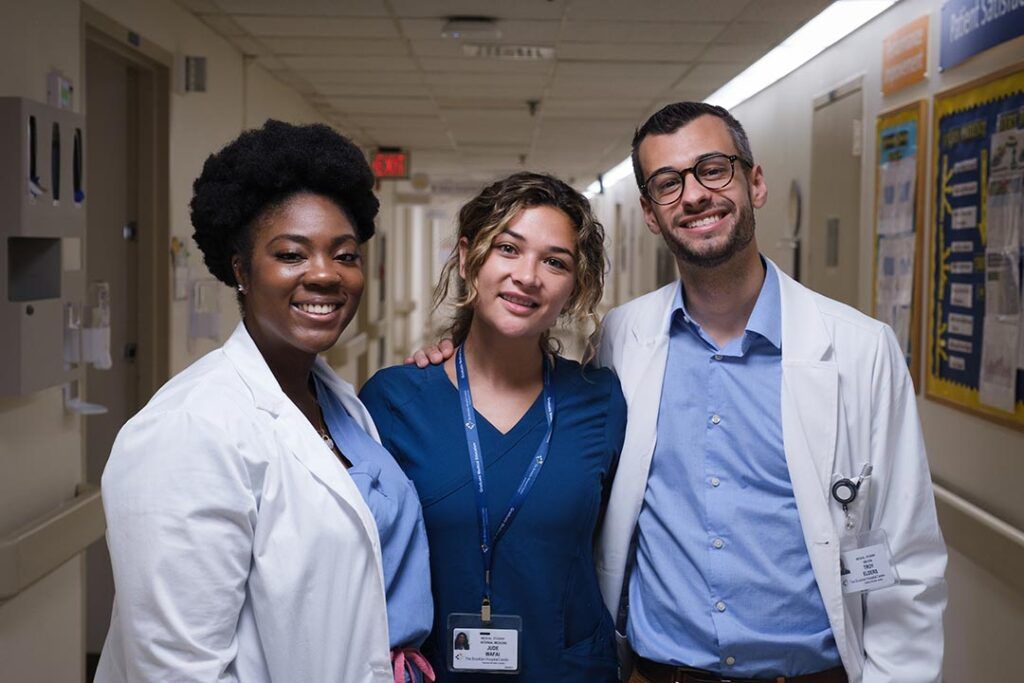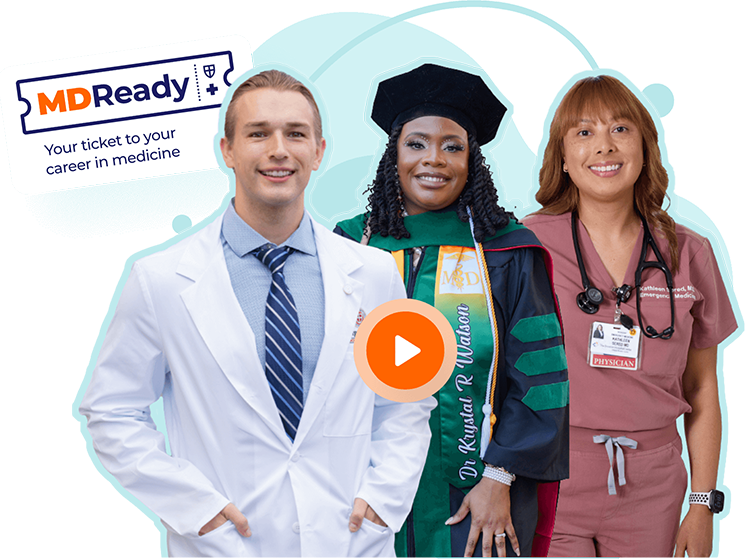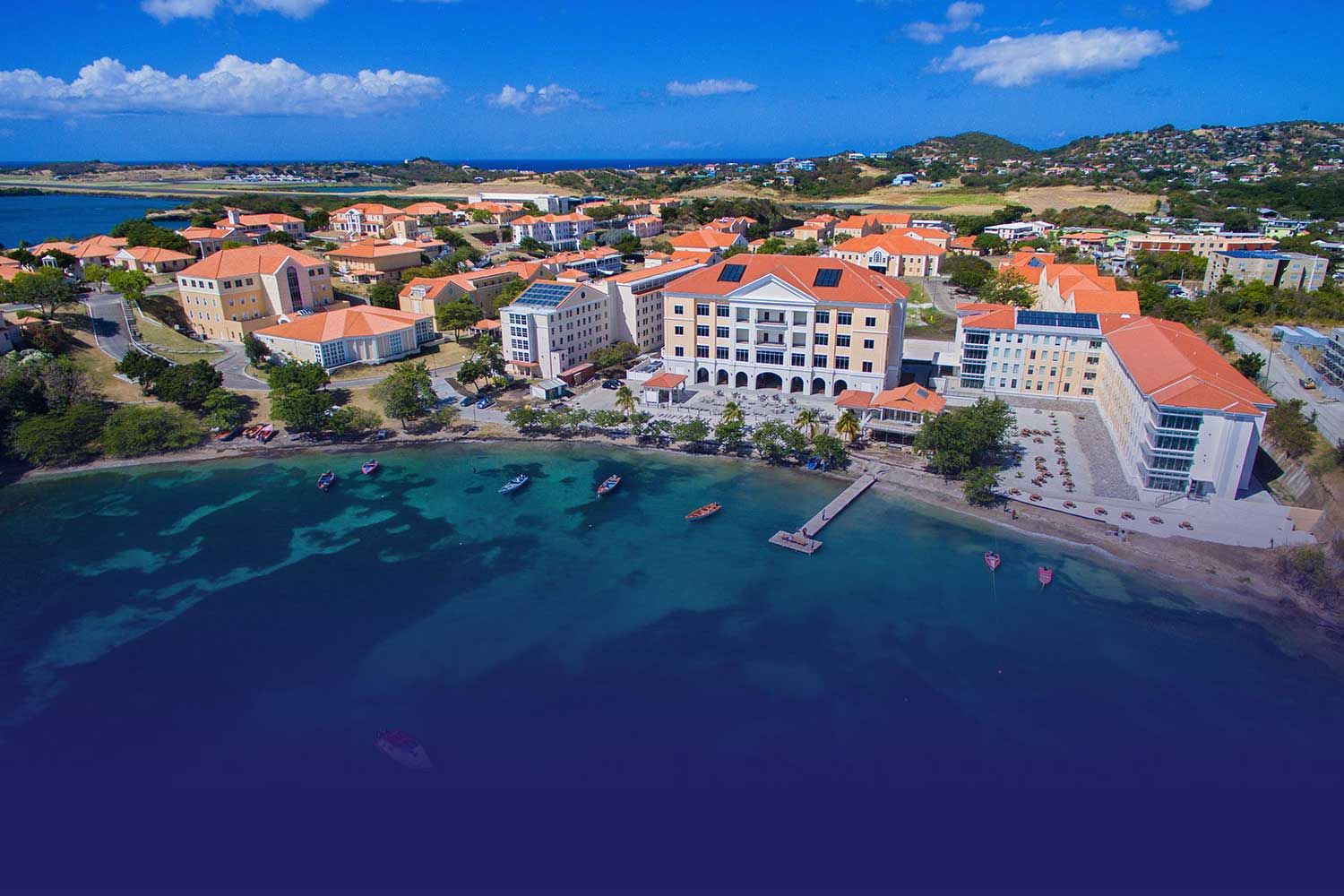Doctor of Medicine
Our accredited MD program offers flexible start dates in April, August, or January, and a proven track record of US residency placements. Join a global community and take the next step toward achieving your medical career goals at SGU.
Program Overview
Program
SGU offers a systems-based curriculum with an emphasis on clinical skills instruction and case-based teaching plus clinical training.
Locations
Years 1-2:
Grenada
Years 3-4:
US, UK, or Grenada
Entry Terms
April, August, or January
Next Start Date:
April 2026 (Grenada)
January 2026 (UK)
View All SGU
Medical Programs
St. George’s University (SGU) School of Medicine offers a comprehensive Doctor of Medicine (MD) program designed to accommodate students from diverse educational backgrounds worldwide. With multiple entry points, including the four-year MD program, and the five-, six-, and seven-year tracks, SGU provides a tailored medical education pathway for each student.
SGU’s MD program is accredited by the Grenada Medical and Dental Council (GMDC), recognized by the World Federation of Medical Education (WFME), and the U.S. National Committee on Foreign Medical Education and Accreditation (NCFMEA). It is also approved by key regulatory bodies, including the New York, New Jersey, and California state boards, as well as the Florida Commission on Independent Education.
Choose Confidence:
A New Route to a Future in Medicine
Dream It.Try It.Become It.
SGU’s MDReady lets you experience medical school firsthand before making a full financial or academic commitment.
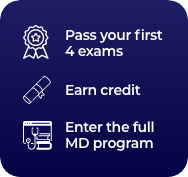
Pass your first 4 exams
Earn credit
Enter the full MD program
Academic Outcomes
Students from across the world come to St. George’s University for a rewarding education with global impact.
Average of 2020, 2021, 2022, 2023 and 2024 residency placement rates. Residency placement rate is defined as the total number of students/ graduates who obtained a US residency divided by the total number of students / graduates who applied to a US residency program in a given year as of October 2024.
95%
US residency placement rate for US graduates over the last five years.1
1) Average of 2021, 2022, 2023, 2024 and 2025 residency placement rates. Residency placement rate is defined as the total number of US students/graduates who obtained a US residency divided by the total number of US students/graduates who applied to a US residency program in a given year as of September 2025.

Average of 2020, 2021, 2022, 2023 and 2024 residency placement rates. Residency placement rate is defined as the total number of students/ graduates who obtained a US residency divided by the total number of students / graduates who applied to a US residency program in a given year as of October 2024.
11th Year in a row
SGU secured more US residency positions than any medical school in the world.2
2) As the medical school graduating the largest number of students per year, SGU places the largest number of graduates into residency programs each year, based on internal SGU graduate/expected graduate and residency placement data as of September 2025.

Average of 2020, 2021, 2022, 2023 and 2024 residency placement rates. Residency placement rate is defined as the total number of students/ graduates who obtained a US residency divided by the total number of students / graduates who applied to a US residency program in a given year as of October 2024.
82%
Pass rate of SGU students from the US taking the USMLE Step 1 for the first time 2020-2024 had an 82% pass rate3
3) Total results from the five calendar years 2020-2024. First-time pass rate is defined as the number of US students (US citizens/permanent residents) passing USMLE Step 1 on their first attempt divided by the total number of US students taking USMLE Step 1 for the first time within the given time range. In order to be certified to take USMLE Step 1, students are required to pass all basic sciences courses.

Average of 2020, 2021, 2022, 2023 and 2024 residency placement rates. Residency placement rate is defined as the total number of students/ graduates who obtained a US residency divided by the total number of students / graduates who applied to a US residency program in a given year as of October 2024.
89%
Pass rate of SGU students from the US taking the USMLE Step 2 for the first time 2021-2025.4
4) Total results from the five academic years 2021-2025. First-time pass rate is defined as the number of US students passing USMLE Step 2 CK on their first attempt divided by the total number of US students taking USMLE Step 2 CK for the first time. USMLE Step 2 CK is typically taken upon completion of third-year core clinical rotations

Curriculum
Basic Sciences
The first phase of SGU’s MD program focuses on foundational medical sciences through a systems-based, clinically-integrated curriculum. Students can choose to begin their studies on SGU’s purpose-built campus in Grenada, featuring modern facilities and a supportive academic environment, or through our partnership with Northumbria University in Newcastle, UK.
Clinical Training
After completing the basic sciences, students transition to clinical rotations at over 85+ affiliated hospitals and health systems across the United States, United Kingdom, and Canada. These hands-on experiences allow students to develop essential practical skills, gain exposure to diverse healthcare systems, and prepare for residency and future medical practice.
Preclinical Year 1
Preclinical Phase
34 Credit Hours
BIOL 320: Human Biology/Lab
4 Credits
BIOL 221: General Biology/Lab
4 Credits
CHEM 122: General Chemistry I
3 Credits
CHEM 124: General Chemistry II
3 Credits
PSYC 201: Introduction to Psychology
3 Credits
MATH 120: College Math
3 Credits
COMH 115: Health Education
3 Credits
ENG 213: College English
3 Credits
Elective
3 Credits
Preclinical Year 2
Preclinical Phase
35 Credit Hours
BIOL 101: Anatomy and Physiology I
4 Credits
BIOL 202: Anatomy and Physiology II
4 Credits
COMM 302: Public Speaking
3 Credits
MATH 220: Statistics
3 Credits
NUTR 201: Nutrition
3 Credits
PSYC 316: Health Psychology
3 Credits
PUBH 302: Public Health
3 Credits
Preclinical Year 3
Preclinical Phase
40 Credit Hours
BIOL 320: Genetics
3 Credits
BIOL 401: Microbiology/Lab
4 Credits
BIOL 441: Physiology/Lab
4 Credits
BIOL 460: Human Anatomy
4 Credits
PCLN 380: Clinical Cases
2 Credits
PSYC 411: Intro to Psychopathology
3 Credits
Academic Year 1
Term 1
BPM 500: Basic Principles of Medicine I
BPM 500: Basic Principles of Medicine I (BPM1)
- Foundation to Medicine (FTM): 6 weeks
- Musculoskeletal System (MSK): 4 weeks
- Cardiovascular, Pulmonary and Renal Systems (CPR): 7 weeks
Term 2
BPM 501: Basic Principles of Medicine II
BPM 501: Basic Principles of Medicine II (BPM2)
- Endocrine and Reproductive Systems (ER): 3 weeks
- Digestive System and Metabolism (DM): 4 weeks
- Nervous System and Behavioral Sciences (NB): 11 weeks
Academic Year 2
Term 3
BPM 502: Basic Principles of Medicine III
BPM 502: Basic Principles of Medicine III (BPM3)
6 weeks with four thematic areas:
- Basics of Immunology and Microbiology
- Public Health Assessment Tools
- Culture and Societal Issues/Physician-Patient Relationship
- Ethics, Professionalism and Medical Jurisprudence
Term 4
PCM 500: Principles of Clinical Medicine I
PCM 500: Principles of Clinical Medicine I (PCM1)
- Foundations to Clinical Medicine (FTCM): 4 weeks
- Neurological, Cardiovascular, and Renal Systems Module (NCRS): 6 weeks
- Respiratory, Hematopoietic, and Pediatric Systems (RHPS): 4 weeks
- Digestive, Endocrine, and Reproductive Systems (DERS): 6 weeks
Term 5
PCM 501: Principles of Clinical Medicine II
PCM 501: Principles of Clinical Medicine II (PCM2)
- Musculoskeletal System and Infections: 4 weeks
- Cardiology, Pulmonology, Renal, and Hematology: 4 weeks
- Gastroenterology, Obstetrics, Endocrinology, and Reproductive: 4 weeks
- Dermatology, Neurology, Psychiatry, and Rheumatology: 4 weeks
Academic Years 3-4
Core Rotations
42 Weeks
Academic Year 3
Internal Medicine
12 Weeks
Surgery
12 Weeks
Psychiatry
6 Weeks
Obstetrics/Gynecology
6 Weeks
Pediatrics
6 Weeks
Family Medicine
6 weeks (may be taken in Year 4 dependent on clinical placement)
Sub-Internships and Electives
38 Weeks
Academic Year 4
Medicine Elective
4 Weeks
Medicine Subinternship
4 Weeks
Additional Electives
24-26 Weeks
Your Path to Becoming a Doctor
SGU’s Four-Year MD program combines two years of rigorous basic sciences study with hands-on clinical training at over 85+ affiliated hospitals and centers in the US, UK, and Canada.
Additional entry points are designed for students from all educational backgrounds. SGU offers tailored MD tracks, including five-, six-, and seven-year pathways, ensuring a clear route to your medical career.
One MD Degree Program, Three Locations
SGU is truly an international institution, not only with its diverse student body and faculty but the unique opportunity for students to begin their medical education in Grenada or the UK. The two paths feature the same curriculum and provide a strong foundation for SGU’s future physicians. Students have the option of doing clinical rotations either in the US or the UK in the last two years.
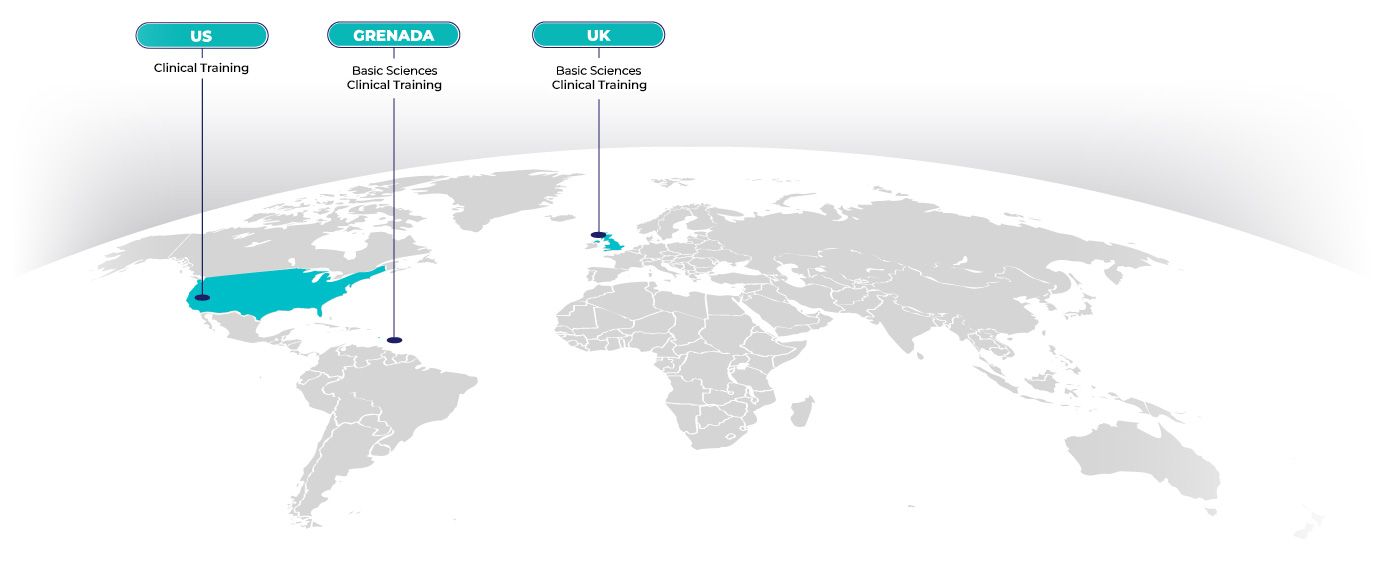
Multiple Entry Points for Medical Students
There are a range of entry points into our MD program and tracks, accommodating applicants of all educational systems and academic backgrounds.
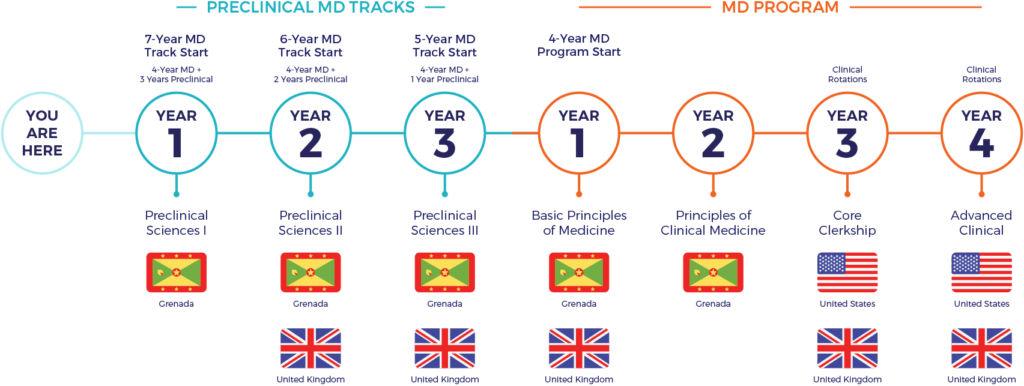
Investing In Your Future
SGU’s medical school tuition compares favorably with other top medical schools — and we offer scholarships and other financial aid assistance.
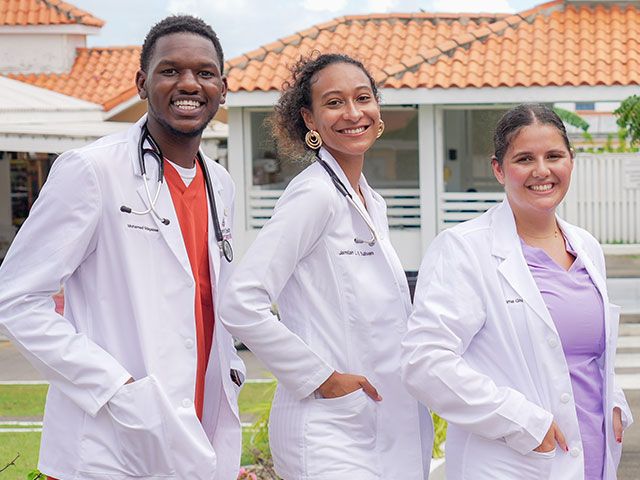
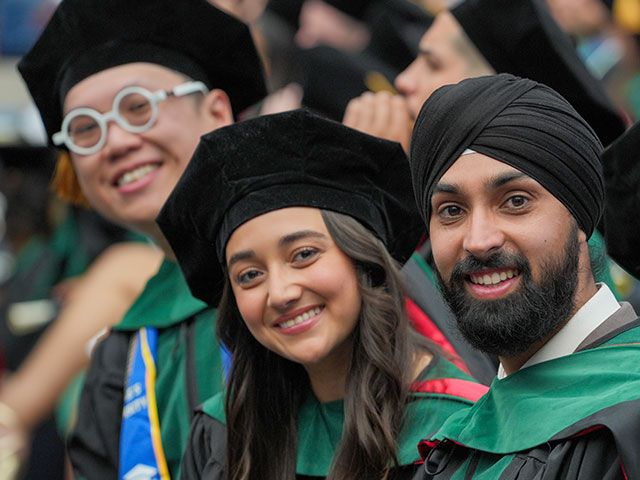
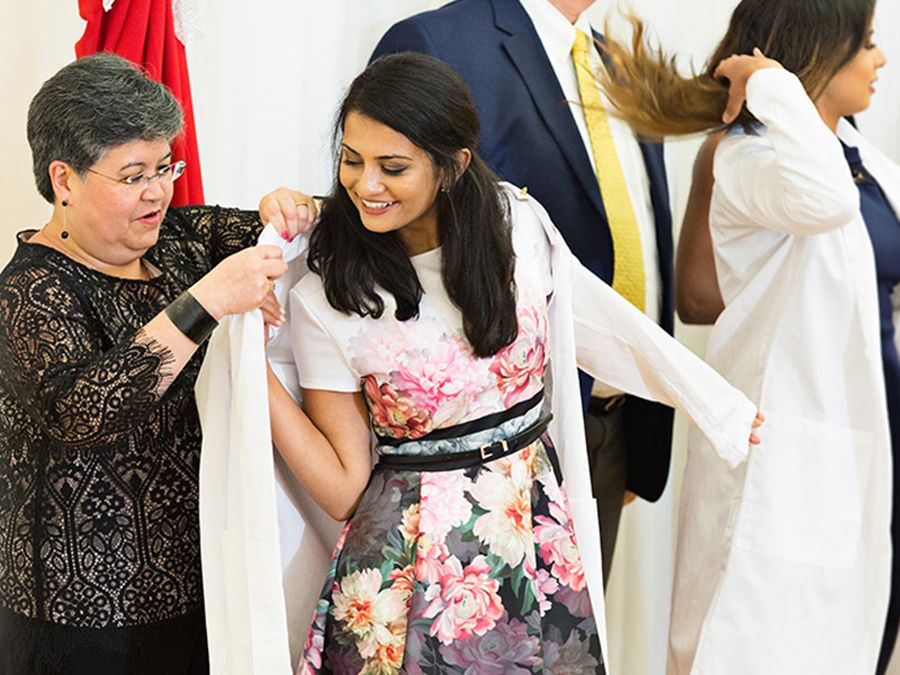
From Dr.eam To Doctor
Learn more about our MD program and tracks
Every aspect of our MD program and tracks are intentionally designed to support you on your path to becoming a physician.
Flexible Start Dates: Choose from multiple entry terms in April, August, or January to begin your medical education at your convenience.
Average of 2020, 2021, 2022, 2023 and 2024 residency placement rates. Residency placement rate is defined as the total number of students/ graduates who obtained a US residency divided by the total number of students / graduates who applied to a US residency program in a given year as of October 2024.
Program and Track Highlights
- Global Recognition: SGU’s School of Medicine has been continuously accredited for decades, enabling our students to be eligible to practice in the US.
- Clinical Training: 85+ hospitals and health systems in the United States, Canada, and the United Kingdom offer clinical and ambulatory training and support
- Legacy of Excellence: Join the network of over 25,000 graduates* who have impacted healthcare worldwide.
*Based on the number of students who have completed the Doctor of Medicine program from 1981-2025.

Connect With Us.
- Learn more about our MD program and tracks
- Receive priority invitations to our prospective student events
We will be in touch soon, but if you have questions now, email us at admissions@sgu.edu

